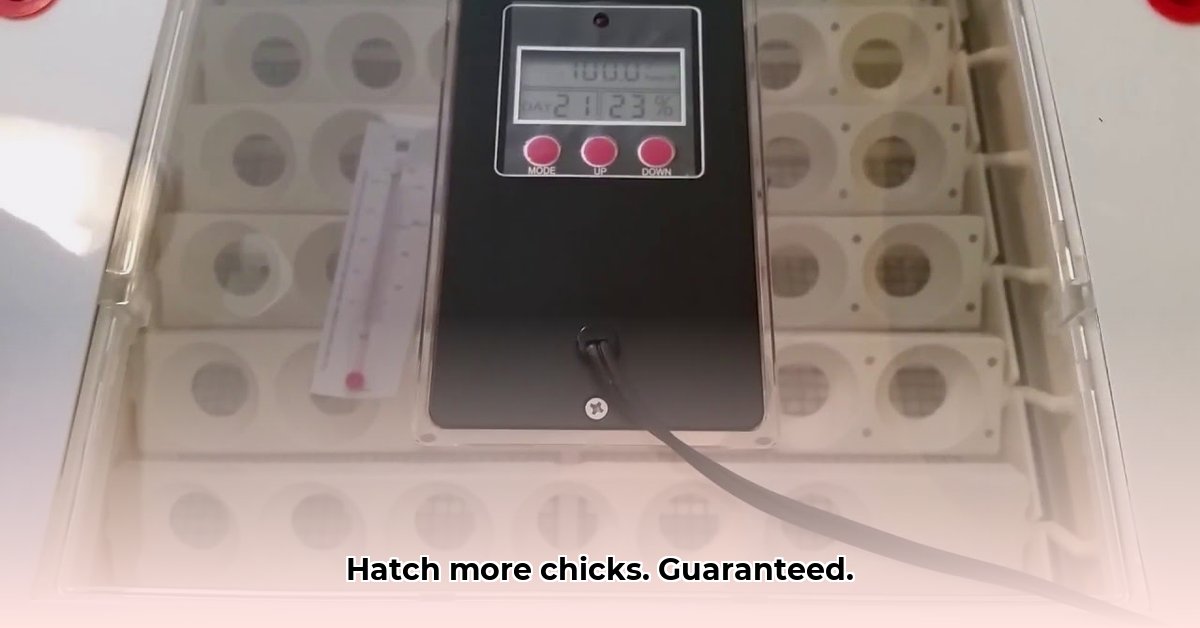
Chicken Incubator Tractor Supply: Your Guide to Successful Hatching and Sustainable Farming
Raising chickens and boosting your hatch rates can be incredibly rewarding, whether you're a seasoned farmer or just starting out. Tractor Supply offers a variety of chicken incubators to help you build a thriving, sustainable poultry operation. This guide will walk you through choosing the right incubator, setting it up for success, maximizing your hatching success, and minimizing your environmental impact. For more incubator options, check out this helpful resource: Tractor Supply Incubators.
Choosing Your Perfect Tractor Supply Chicken Incubator
Tractor Supply offers several incubator models, each with its own advantages. Your choice depends on your flock size, available space, and budget. Are you aiming for a small hobby farm or a larger operation?
| Feature | Small Incubator (e.g., 40 eggs) | Large Incubator (e.g., 100+ eggs) |
|---|---|---|
| Upfront Cost | Lower | Higher |
| Energy Use | Lower | Higher |
| Space Needed | Less | More |
| Hatching Success | Possibly lower; easier to manage | Potentially higher; requires more attention |
| Maintenance | Simpler | More involved |
Before purchasing, read online reviews. Pay close attention to energy efficiency – a key factor for sustainable farming. A lower wattage rating generally indicates lower energy usage. Do you have a preference for automatic egg-turning or manual turning?
Setting Up Your Tractor Supply Chicken Incubator: A Step-by-Step Guide
Proper setup is crucial for high hatch rates. Follow these steps:
Deep Clean: Thoroughly clean and disinfect your incubator before using it. This prevents disease spread.
Egg Selection: Choose fertile eggs from healthy hens. Proper egg storage before incubation is also vital for success. Did you know that storing eggs at a stable temperature of 55-60°F can greatly improve hatchability?
Egg Placement: Arrange eggs as per the manufacturer's instructions for even heating.
Temperature and Humidity Control: Maintain ideal temperature and humidity using a reliable thermometer and hygrometer. Consistent monitoring and adjustments are essential. What's the ideal temperature range for your chosen incubator model?
Egg Turning: Follow the egg-turning schedule. Automatic turners simplify this crucial step. Consistent turning is vital for proper embryo development.
Incubation Period: Allow the full incubation period. Rushing the process will reduce your hatch rate.
Hatching Stage: Observe carefully, but avoid excessive handling during hatching.
Boosting Your Hatch Rates: Tips and Tricks
Beyond the setup, several factors influence hatch success:
Egg Quality: Start with high-quality, fertile eggs from healthy hens. Regular health checks for your hens are a proactive measure.
Consistent Conditions: Maintain steady temperature and humidity. If your incubator lacks automatic controls, consider investing in a thermostat and humidifier.
Diligent Turning: Never skip egg turning to prevent embryos from sticking to the shell.
Biosecurity: Maintain a clean environment to prevent disease.
Sustainable Practices: Farming with Environmental Responsibility
Consider the environmental impact of your poultry farming:
Energy Efficiency: Choose energy-efficient incubators and consider alternative energy sources like solar power. How much energy does your chosen incubator use compared to others on the market?
Waste Management: Compost eggshells and chicken waste to reduce your environmental footprint and create valuable fertilizer.
Ethical Poultry Keeping: Prioritize your chickens' well-being.
By combining a Tractor Supply incubator with sustainable practices, you can build a profitable and environmentally responsible poultry operation.Careful planning and attention to detail are key.
How to Reduce Energy Consumption in Large-Scale Egg Incubators
Key Takeaways:
- Optimize incubation schedules to reduce energy waste.
- Invest in energy-efficient incubator models.
- Explore alternative energy sources like solar power (after a cost-benefit analysis).
- Regular maintenance and proper insulation improve efficiency.
Large-scale egg incubation presents high energy consumption challenges. Here's how to mitigate this:
Smart Scheduling: Timing is Everything
Optimize incubation schedules to leverage off-peak electricity rates. This can significantly reduce energy costs.
Energy-Efficient Incubator Models: The Long-Term Investment
High-efficiency incubators, while initially more expensive, offer considerable long-term energy savings due to features like advanced insulation and efficient heating elements.
Harnessing the Sun: Solar Power Integration
Solar power can reduce reliance on grid electricity. However, carefully assess the cost-benefit feasibility based on your location and solar irradiance.
Simple Maintenance, Big Impact
Regular maintenance (like cleaning filters) and proper insulation minimize heat loss, keeping energy costs low.
Monitoring and Tracking: Data-Driven Decisions
Use energy meters to track consumption and identify areas for improvement.
Exploring Alternative Heating Methods
Consider alternative heating methods such as passive solar heating or innovative, highly-insulated systems.
The Bigger Picture: Sustainable Practices
Sustainable practices benefit both the environment and your bottom line. They build a more resilient and profitable farming operation.